Essen Pop & Blues Festivals 1969-1970 | Interview with Konrad Mallison
The Internationales Essener Pop & Blues Festivals 1969-1970 were legendary German festivals organized by Konrad Mallison. Some of the artists that performed included Fleetwood Mac, Yes, Free, Deep Purple, Pink Floyd, Muddy Waters, Champion Jack Dupree, the Pretty Things and Tangerine Dream.
“Everyone loved the music and were united by that.”
Where did you grow up and what influenced you?
Konrad Mallison: As a result of my father’s career changes, I grew up in Berlin, Bochum and from the age of 11 in Essen. Most certainly my father influenced my good humanistic education. Unfortunately my father died very early when I was only 15 years old.
Would you like to talk a bit about your background?
After finishing grammar school, I completed a 2-year industrial clerk apprenticeship at Siemens in Essen. During the 2nd year of training, I also began studying business administration in Cologne. After finishing the Siemens apprenticeship I supported an old school friend in building up a pipeline company by completing the first order of 100 TDM, which was a big order at that time.
“The underground scene in Germany in 1968 really arose through the influence of flower power from San Francisco, the musical HAIR, and also somewhat through the politicized ’68 movement throughout Europe.”
How did you first get interested in rock music?
After about a year, a completely different career perspective emerged: I was 23 years old and in 1967 I visited a new, in Germany unique and extremely progressive discotheque called ‘Cream Cheese’ in Düsseldorf’s historical centre. New light-show and film performances were thrown on the walls, a so-called psychedelic music was played, and from time to time an equally progressive blues and rock music by, for example, Cream, Jimi Hendrix and similar bands that I had not known until then. Since I had inherited a small fortune from my father for the circumstances at that time, I decided to establish a similarly progressive discotheque with the same psychedelic, blues/rock music and light show/film effects in Essen in cooperation with a good friend. This succeeded in the same year 1967. We called the disco Pop-In. Here an advertisement in the programme of the 1st International Essen Pop & Blues Festival from 09.-11.10.1969:
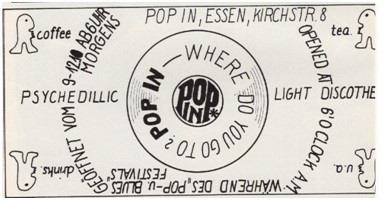
How would you describe the German ‘underground’ rock scene of the late sixties and early seventies?
I was strongly influenced by the operation of my discotheque Pop-In. As a result I favoured exclusively underground and psychedelic music, as it was called at that time. If I remember correctly, we played music by groups like Tangerine Dream, Can, Xhol Caravan, but also Canned Heat, Crosby, Stills, Nash & Young, Grateful Dead, Jefferson Airplane, Janis Joplin, Joe Cocker etc. The underground scene in Germany in 1968 really arose through the influence of flower power from San Francisco, the musical HAIR, and also somewhat through the politicized ’68 movement throughout Europe. People wore longer hair and showed their peaceful inner attitude to the outside. The youth welfare office of the city of Essen even organised the “Essener Song-Tage” in 1968, a first big, but somewhat politicized song festival with top-of-the-bill Mothers Of Invention with Frank Zappa, Alexis Korner, Guru Guru Groove, Soul Caravan, Amon Düül, Julie Driscoll, Brian Auger & The Trinity. Because of the politicization there were unfortunately some small excesses, this song festival was not repeated by the city of Essen. Here’s the poster of the Essen Song Days 1968:
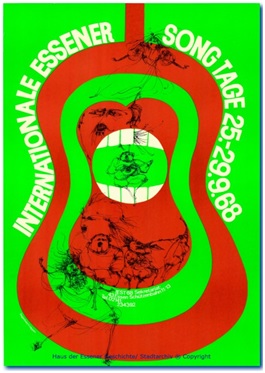
When did you become a promoter of rock music and how did that come about?
In June 1969 I took my disc jockey from my discotheque Pop-In for an exciting motorbike ride to England. We visited friends in Warrington near Liverpool and then drove down the west coast to Cornwall. After a few days of rest there we wanted to go back home via London. By chance we saw a promotional poster about the Bath Festival of Blues with rock stars like Led Zeppelin, Fleetwood Mac, Colosseum, The Nice, John Mayall, Ten Years After, Taste, Savoy Brown, Chicken Shack and many other bands:
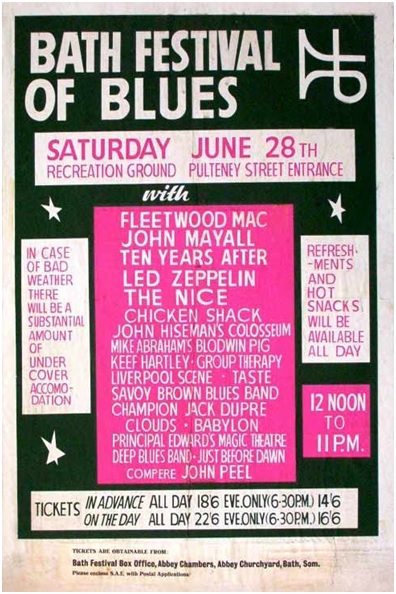
We did not want to miss this event. Thus we drove to Bath on 28.06.1969 and visited the festival from 12:00 – 23:00 o’clock. During the 11 hours about 22 bands played non-stop on 2 stages without any breaks. This festival with its sensational gigs, also with Jethro Tull / Ian Anderson, who were not mentioned on the poster, created a spark in me, so that I decided to do everything to organize a similar festival in the Grugahalle in Essen in October 1969.
You organized Essen Pop & Blues Festivals 1969-1970. How did it happen and what difficulties did you have to deal with at the same time?
When we arrived in London from Bath, I visited the Marquee Club in Wardour Street the same evening. I had heard that all the major bands play there. After a show in the evening I went backstage and asked a band manager if he knew how or through whom I could engage well-known British bands for a festival in Germany. By chance I had already found the right manager backstage. He invited me to come to his agency the very next day to discuss everything. After the visit to the agency it was clear that the engagement of bands was no problem, not even of absolute top bands. When I returned to Essen in early July 1969, I immediately contacted the management of the Grugahalle to find out whether I could rent the hall, which was designed for 8,000 people, for 3 days in October 1969. It was said that such a date was still possible, but because of the events of the previous year, the renting had to be approved by the Lord Mayor of Essen. I was able to convince the Lord Mayor personally that the International Pop & Blues Festival I had planned would take place in an extremely peaceful atmosphere, because it would not be politically instrumentalised as in the previous year, but would be a pure music festival. I received the approval under certain conditions. I had to employ a certain number of security guards to ensure peace and order.
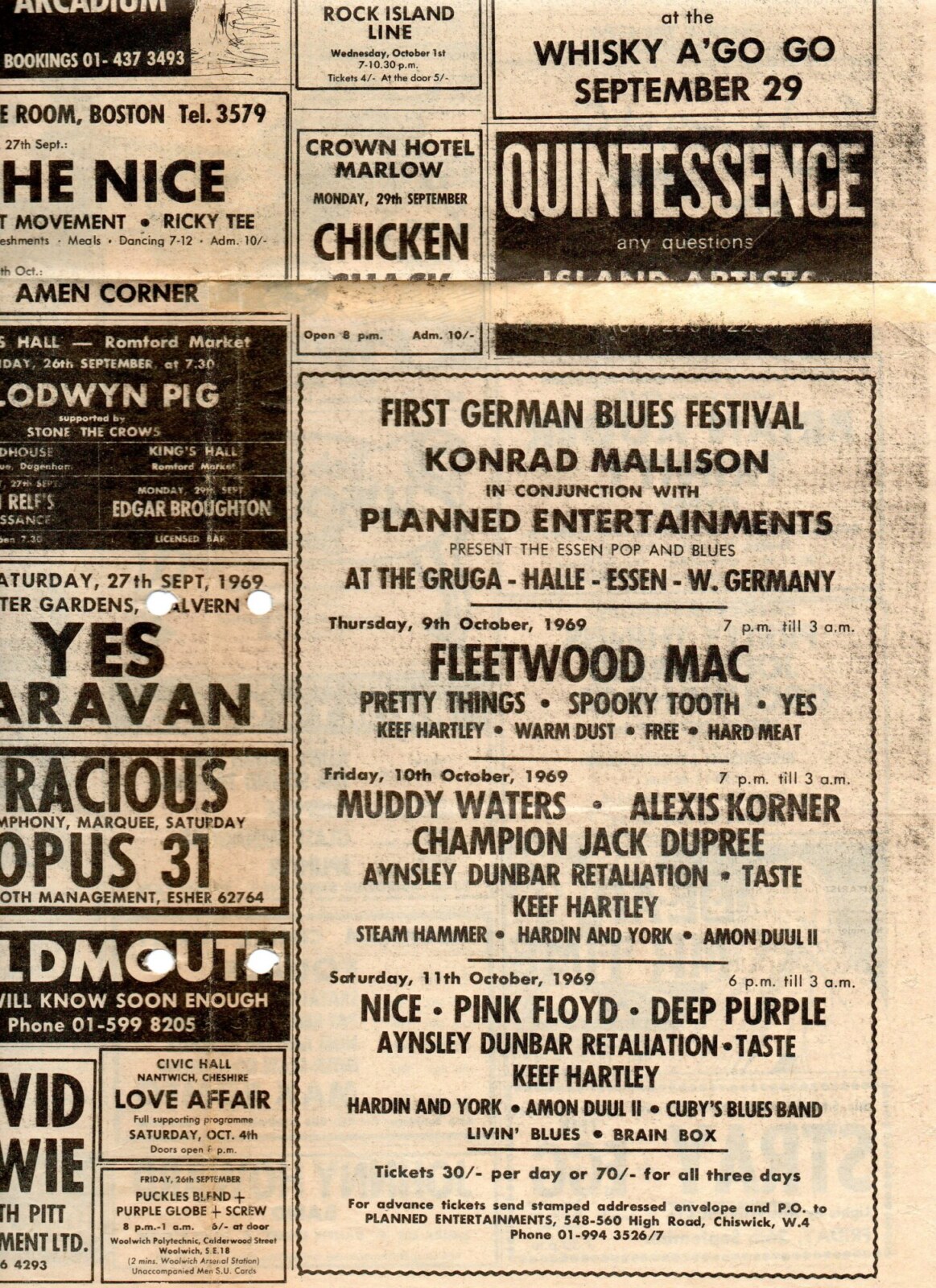
How did you promote the festival?
After signing the contract for the Grugahalle I flew to London and was able to sign the most important bands like Fleetwood Mac, The Nice, Pink Floyd and Deep Purple. Further engagements followed. I also succeeded in getting the WDR television station interested in the festival and signed a contract for recording rights worth DM 40,000. This amount covered almost the entire fees of the bands. For the administrative preparation of the festival, I needed staff at short notice for tasks such as press relations, event management, advertising, artists/ painters to produce an oversized advertising display for the Grugahalle, posters, programme booklet and stickers, photography etc. I was able to recruit almost all of these from my circle of friends, whom I still knew from school. Here is a photo of the management team shortly before the start of the festival on Oct. 9, 1969 in the still empty Grugahalle, taken by a reporter from WAZ, a major Essen newspaper, me sitting on top.
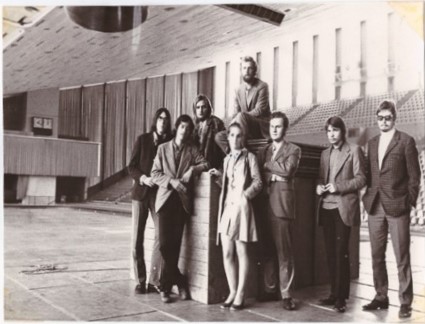
Here is a photo of the Grugahalle shortly before the start of the festival with the huge advertising banner, which Georg Boskamp created standing above on the far righthand side, as well as the festival poster and a photo of me in the still empty hall. Georg later became a well-known art professor in Würzburg.
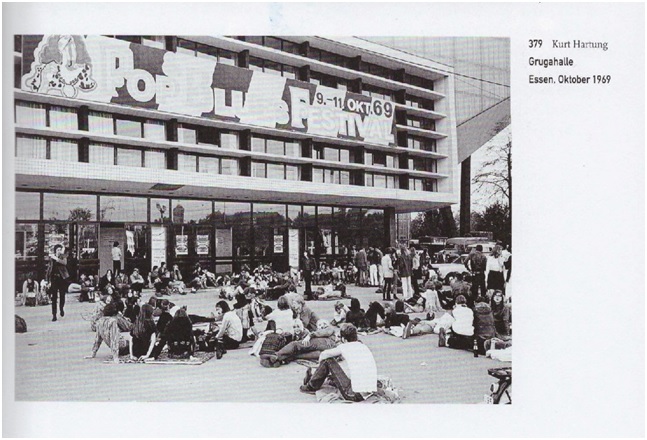
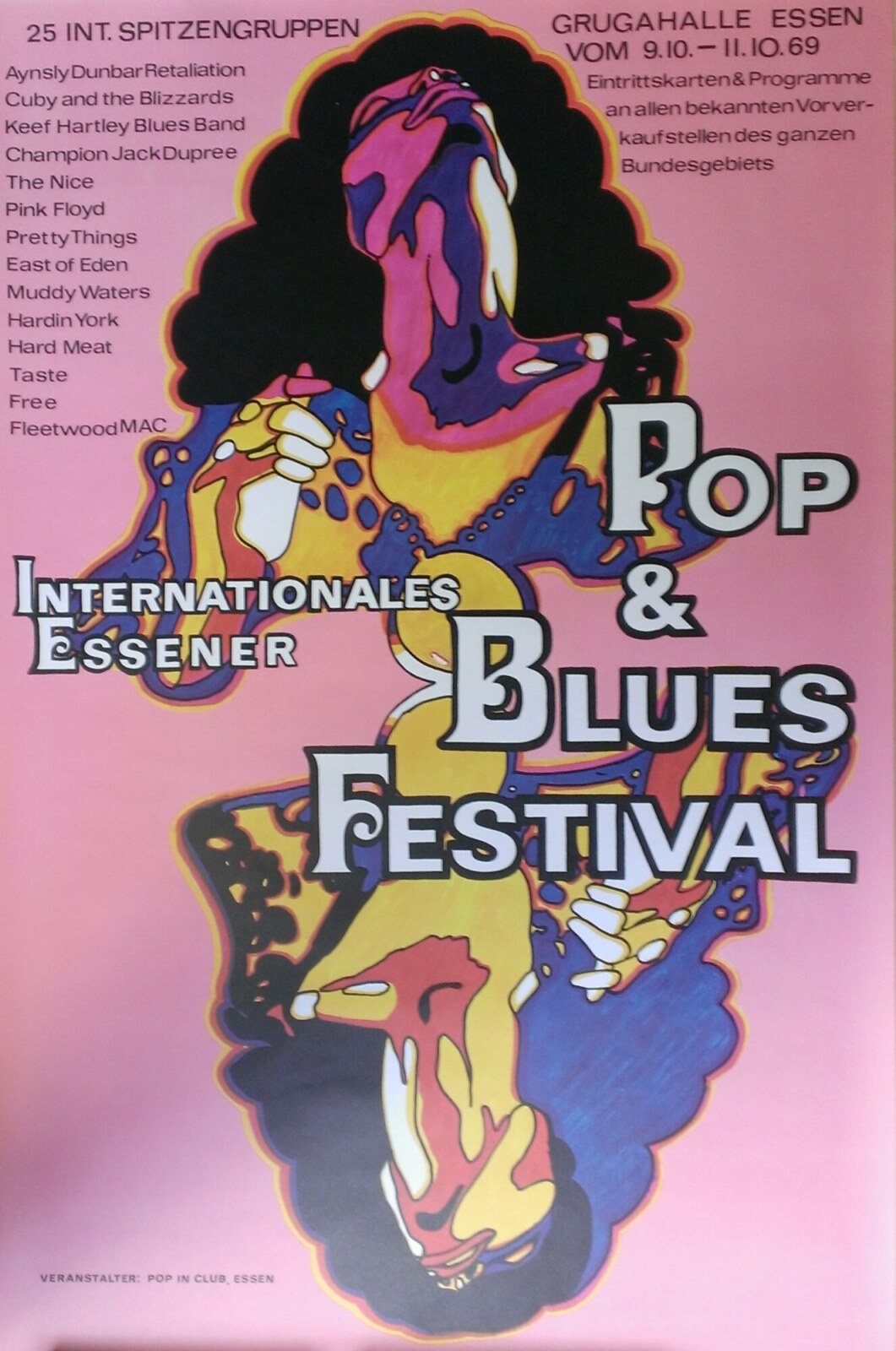
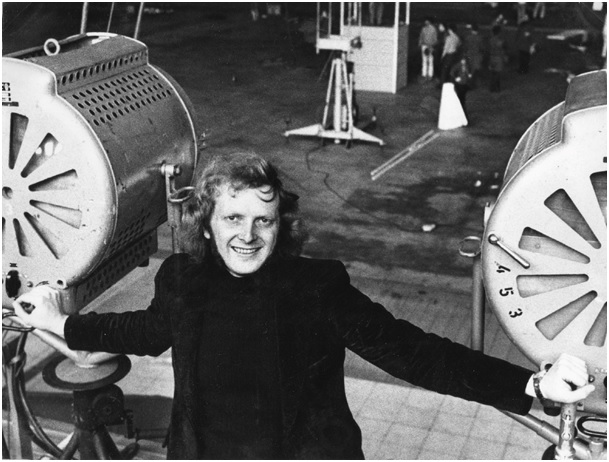
How many people arrived at the festival?
The Grugahalle was approved for 8,000 visitors. It was filled on 09. and 10.10.1969 with about 8.000 – 9.000 people. On 11.10.1969, when Pink Floyd and Deep Purple, among others, performed, the hall was completely overcrowded with at least 13,000 visitors. Some bands played in front of the hall at night for about 1,000 visitors, as unfortunately they had not been able to get a ticket.
I’m sure you have some amazing stories and memories from hanging with some of the most legendary bands?
Yes, there are quite a lot of such stories, the most important one is probably this one: After Deep Purple’s performance it turned out that the band didn’t have a manager with them who is normally responsible for logistics.
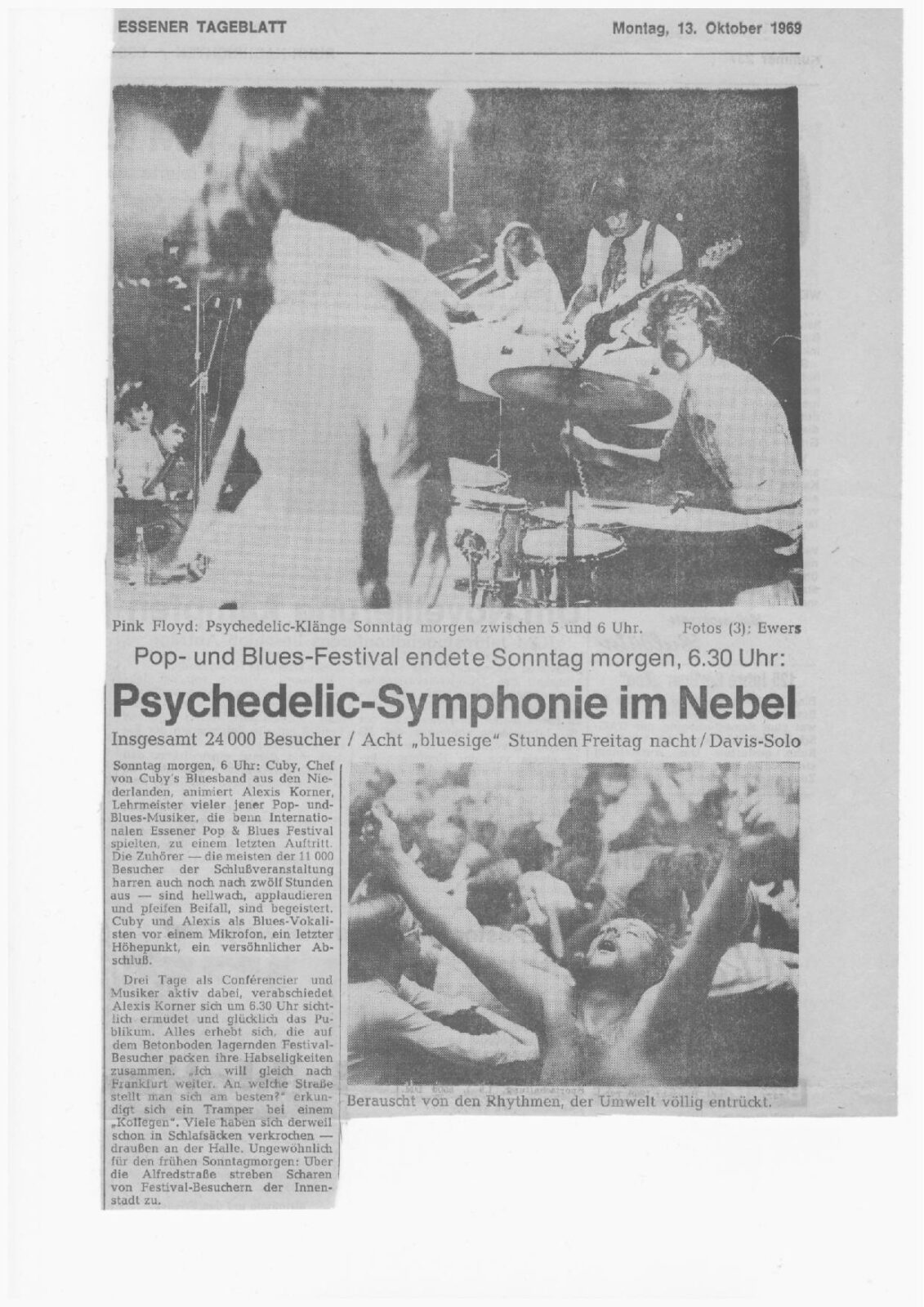
They had to perform the next day in the evening at the Concertgebouw in Amsterdam, didn’t know their way around, didn’t have a hotel in Amsterdam and didn’t know how to get to Amsterdam with the roadies and equipment. I spontaneously agreed to take care of the transfer and logistics. So I drove with the band in my Mercedes 220S from Essen to Amsterdam, followed by the roadies in the truck with the equipment. Early in the morning I looked for a hotel for the band in Amsterdam, where we stayed in several double rooms, completely exhausted. I shared one of the double rooms with drummer Ian Paice. In the course of the 12.10. I brought the band to their venue in the Concertgebouw after the common brunch. Everything went perfectly, harmoniously and in the best mood between me and the band members.
How difficult was it to gather necessary finances for the festival?
Due to the early death of my father I had inherited so much money that I was able to pre-finance the 1st festival from 09-11 October 1969. The other 2 festivals in April and October 1970 and a spectacular CCR concert on April 12, 1970 I was able to finance from the profits. Here a ticket from the CCR concert:
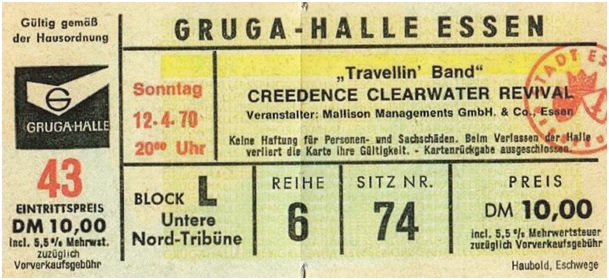
Did any musician have any particular request you had to fill?
There was a dramatic situation when Ginger Baker (Air Force) at the 3rd International Essen Pop & Blues Festival (22nd – 25th October 1970) came to me about 2 hours before his performance and said that he could not perform. He had to see a doctor. I immediately drove him in my car to an emergency doctor. As his attendant I was admitted to the treatment room. Ginger Baker was shaking all over. Apparently the doctor knew immediately what to do. He gave him a heroin injection. Ginger then thanked him, calmed down and was able to finish his performance with his Air Force Big Band brilliantly.
How do you see the work of the organizer? Things are now very different….
Yes, a lot was improvised. Nevertheless, all events were successfully carried out. The festival visitors, press, radio and television were full of praise and enthusiastic. For advertising purposes, the festival posters were put up at all railway stations throughout Germany, as well as on advertising pillars. It was a different time, but it worked, even without internet, email, fax, smartphone, all that did not exist, but the organisation worked anyway.
“There was an extremely loving and peaceful atmosphere in the Gruga Halle.”
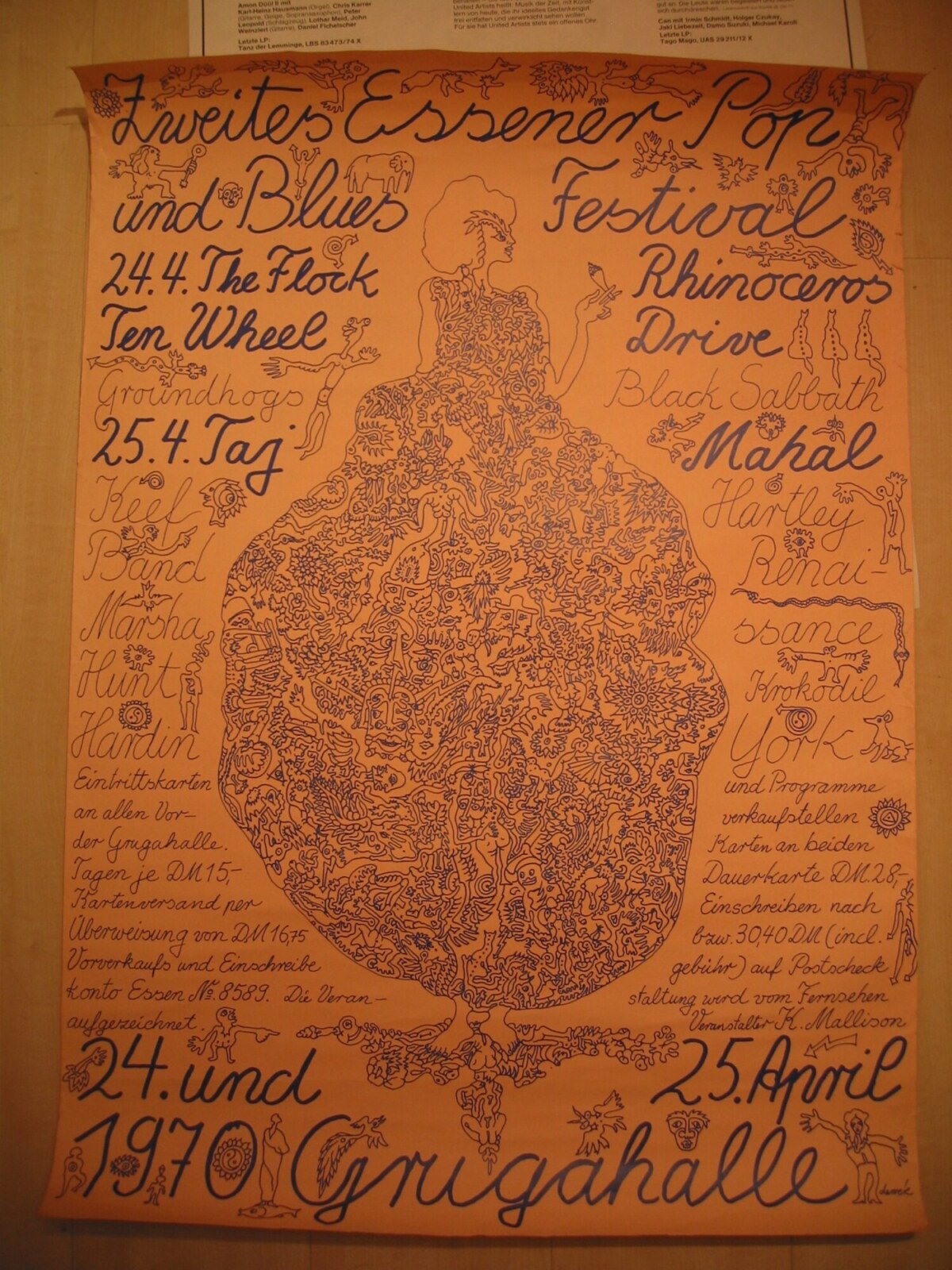
I think we lost that necessary spark when it comes to live concerts. It used to be a labor of love, don’t you think?
That is correct. For example, we used personal contacts from our school days to recruit people who were willing to help spontaneously – without a regular employment contract – as helpers, stewards, photographers, guides for visitors. This was only possible because everyone was excited and turned on by the Flower Power, underground music, musical HAIR, but also by the WOODSTOCK Festival, which had taken place two months before. There was an extremely loving and peaceful atmosphere in the Gruga Halle. Everyone loved the music and were united by that.
How do you see the current situation in music industry?
Unfortunately I see the situation for the next 1-2 years very critically. But I hope that there will be a light at the end of the tunnel and that music events can be held again as before.
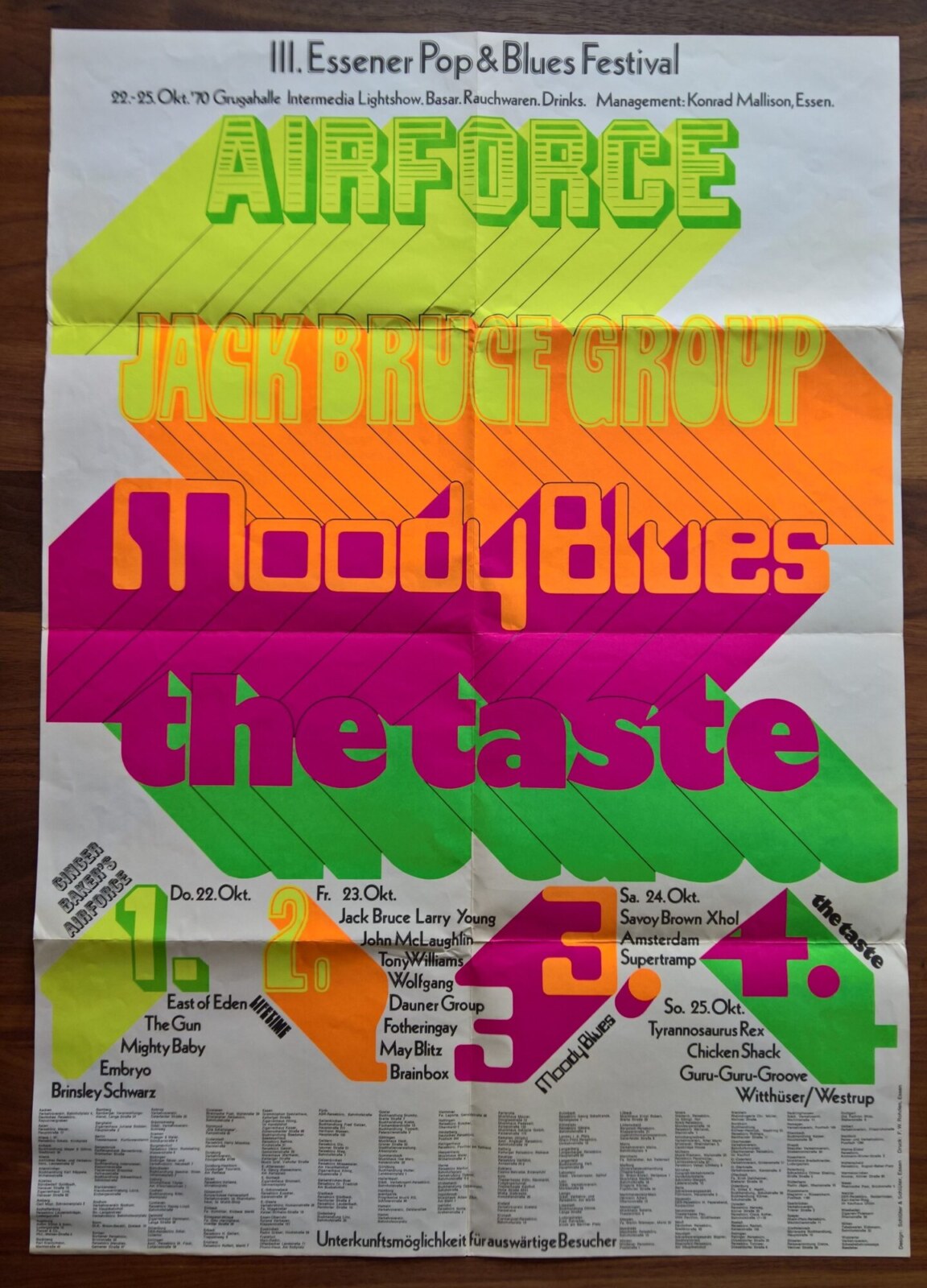
What happened next?
Unfortunately, the 3rd festival from 22-25.10.1970 was not successful financially, although the bands performing were extremely attractive, see program. Therefore I decided to change to the IT branch and can look back on a successful time today.
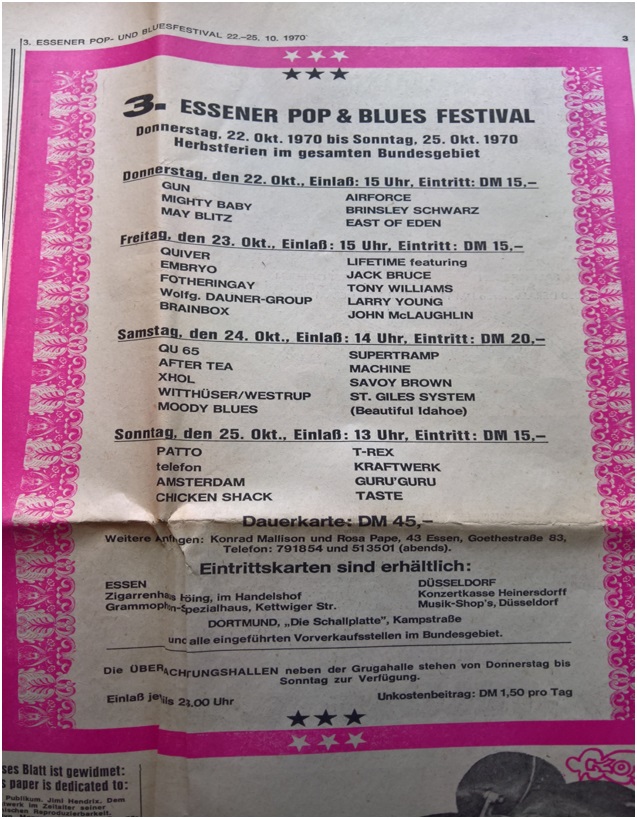
What currently occupies your life?
I became a cultural person and cosmopolitan. I love the extraordinary art and culture of the Renaissance, I love to be in Florence, visit concerts and opera performances, although I still like to listen to and appreciate the hits of my Pop & Blues time as well as songs by Led Zeppelin, Pink Floyd, Deep Purple, Jimi Hendrix, Doors and many more.
Thank you. Last word is yours.
I am happy and satisfied, also a little proud, that I was able to organize the first Pop & Blues Festival in Germany in 1969. The success of this festival was visibly so great that in 1970 a festival euphoria took place nationwide and similar festivals were held in almost every major city.
Thank you very much for this interview. Konrad Mallison
Klemen Breznikar




Thanks for this interesting interview. I was born near Essen a few years after this festival. When I became interested in the music of this period some time in the late 1980s, I was fascinated by the idea that a festival whose line-up included Deep Purple, Pink Floyd and Fleetwood Mac had taken place so near to where I lived in what felt like the stone age to me then. I only knew these bands as mega-selling dinosaurs – here they were like “the next big thing” (or not even that), for 12 Marks admission or 25 Euros in today’s money.
Thomas, about 6 Euros in today’s money only.
If only there were a time machine…
Danke Konrad, dass Du mich wieder an die tollen Zeiten in der Grugahalle erinnert hast. Die Karten habe ich mit zum Geburtstag einen Tag davor gegoennt
Thanks for this extremely interesting information Konrad,,,,I was amazed how you came about organising the rssen concerts in the late 60,70s—,I love how much passion and drive you had(still have )!,I wish I could of seen the gigs,funny you said U drove to the bath festival in 70,I’m about half a mile from where that concert took place now,that must of been amazing to see Konrad,do you remember how led zep were received then?,anyway I said enough thanks again for your words and memories Konrad, hope the music keeps going cheers from bath. Carl,,,,,
Thanks for this Konrad,Amazon you ate
Hi Konrad, loved reading about the history of the Essen.Grugahalle festival. I was living in Germany in the 70’s and went to the April gig and loved every minute of it, it was a great time with some iconic bands and would like to thank you for some great memories. Still looking for a t shirt of the festival as a momento but no luck so far. Ivan ( Jed) Bone.
Never heard about this event, organized by a few enthuastic young guys in less than 4 months. Nowadays unimaginable. Same inviting a band and them knowing nothing how to travel to Amsterdam and plan all around this concert 😀😂
Loved to read about it and will listen now to Pink Floyd on WDR